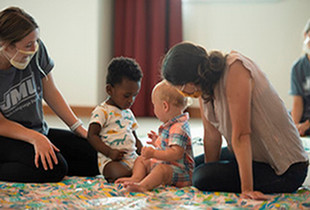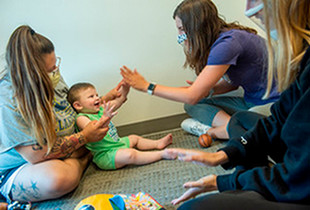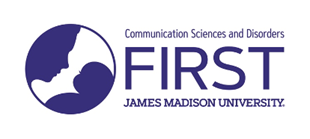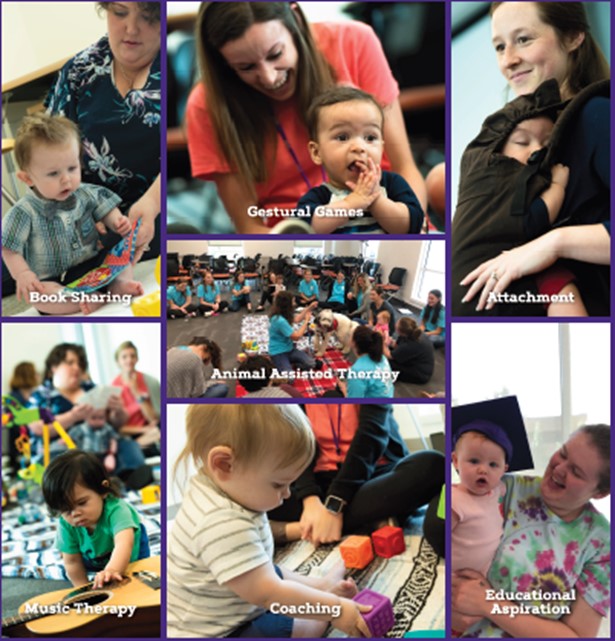Read the Information for Families Considering Participation
Focus of Lab
This laboratory investigates the process of language development in the first year of life with special attention to the interaction between perception and production. Our work concentrates on how the infant's own individual experience affects language learning. In the same way that the onset of reaching makes the idea of distance more real to the infant, the onset of babbling makes adult speech more accessible. For example, as the infant begins to concentrate on specific sounds in babble, those sounds become more noticeable to the infant in the adult speech stream.
Recent work has concentrated on using the expertise acquired from working with families over the past twenty years to develop methods to facilitate language development in populations that have historically underachieved in language. For example, we are working with home health visitors and pediatricians to document early language development in low socioeconomic families and using these efforts to develop language interventions for at risk infants.
The laboratory has an impressive array of tools available to study language including eye tracking, pupilometry, fNIRS,home recording tools (including LENA) and preferential looking paradigms.
Personnel
- Dr. Rory A. DePaolis and Dr. Shiree Harbick
- PhD Students
- Rebecca Jones, MS CCC-SLP
- Clinical Doctoral Students in Audiology (AuD)
- Taylor Huynh, BS, Aubreigh Cartwright, BS
- Undergraduate Students
- Madelyn Fletcher, Lauren Calvin (Honors Student)
Current Projects
Facilitating Infant Responsiveness to Stimulate Talking or FIRST examines the effects of an intervention conducted in conjunction with the JMU Speech, Language and Hearing Clinic on infant language development. The intervention pairs SLP graduate students with local families with babies 6-12 months old. Student, caregiver and infant teams work together to provide enriched language environments that include increased caregiver responsiveness, increased communication turn taking, and promote joint attention. We are measuring outcomes for graduate students, caregivers and infants. This project is in collaboration with Dr. Susan Ingram from JMU, Dr. Charlette McQuilkin from the Rockingham County School Board and Dr. Brenda Seal from Gallaudet and James Madison University.



- A study of differences in the way that low- and mid-SES English- -speaking mothers interact with their infants The research uses LENA software to collect recordings in the participants' homes for analysis.
- The lab is also investigating the use of technology to aid in the development of early language. In collaboration with the researchers from the Departments of Language and Linguistics and Electronics at the University of York in England, we have developed an app that encourages babbling in prelinguistic infants. We are currently finishing a study that uses the app for with at risk populations (i.e. Low SES infants or children with autism).
- Otitis Media such as ear infections can impact language development. We are currently looking at how chronic otitis media impacts word learning in the first year of life. The lab is also looking at how the condition affects parents’ quality of life.
- A new study will look at the differences in joint attention with the infant for the primary versus the secondary caregiver.




